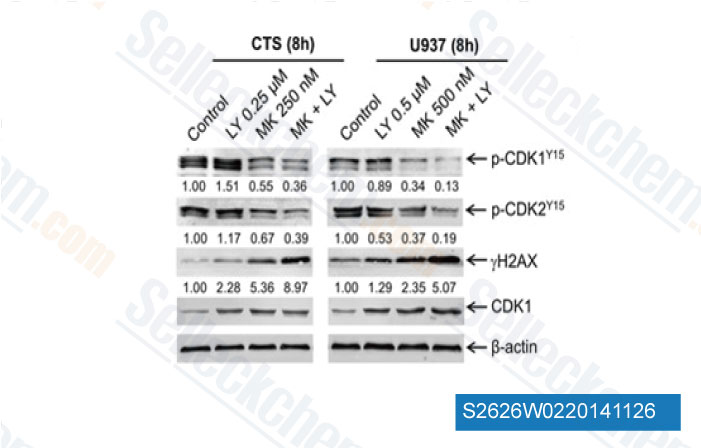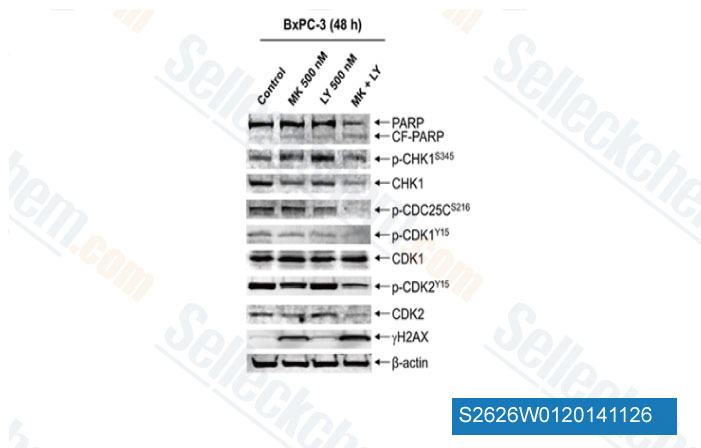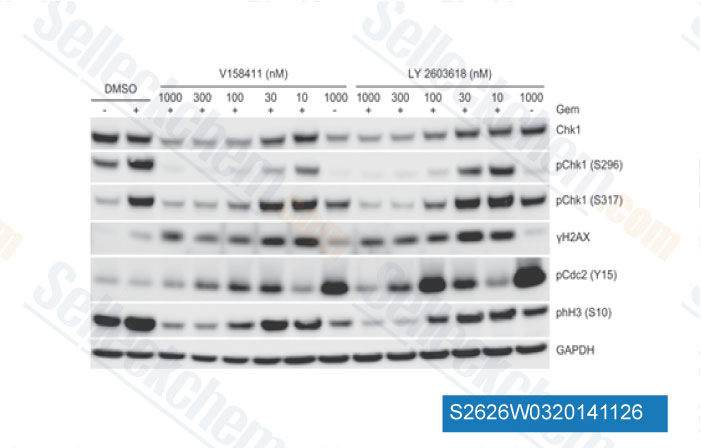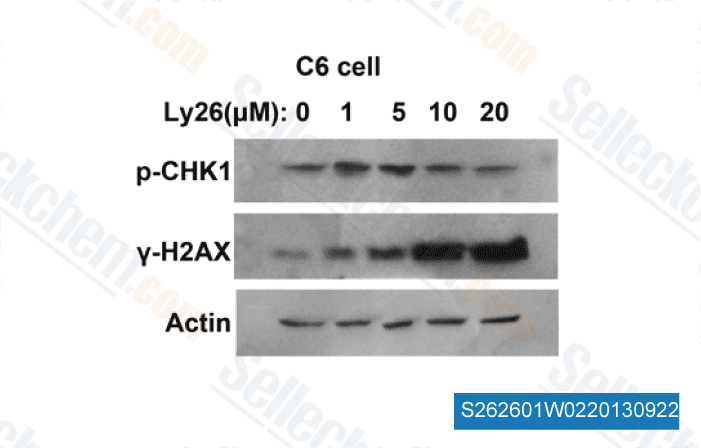|
Toll Free: (877) 796-6397 -- USA and Canada only -- |
Fax: +1-832-582-8590 Orders: +1-832-582-8158 |
Tech Support: +1-832-582-8158 Ext:3 Please provide your Order Number in the email. |
Technical Data
| Formula | C18H22BrN5O3 |
|||
| Molecular Weight | 436.3 | CAS No. | 911222-45-2 | |
| Solubility (25°C)* | In vitro | DMSO | 8 mg/mL (18.33 mM) | |
| Water | Insoluble | |||
| Ethanol | Insoluble | |||
|
* <1 mg/ml means slightly soluble or insoluble. * Please note that Selleck tests the solubility of all compounds in-house, and the actual solubility may differ slightly from published values. This is normal and is due to slight batch-to-batch variations. * Room temperature shipping (Stability testing shows this product can be shipped without any cooling measures.) |
||||
Preparing Stock Solutions
Biological Activity
| Description | Rabusertib (LY2603618, IC-83) is a highly selective Chk1 inhibitor with potential anti-tumor activity in a cell-free assay. IC50=7 nM, showing approximately 100-fold more potent against Chk1 than against any of the other protein kinases evaluated. Rabusertib (LY2603618) induces cell cycle arrest, DNA damage response and autophagy in cancer cells. Rabusertib (LY2603618) induces bak-dependent apoptosis in AML cell lines. | ||
|---|---|---|---|
| Targets |
|
||
| In vitro | Chk1 is an ATP-dependent serine-threonine kinase and a key component in the DNA replication-monitoring checkpoint system activated by double-stranded breaks (DSBs). Chk1 contributes to all currently defined cell cycle checkpoints, including G1/S, intra-S-phase, G2/M, and the mitotic spindle checkpoint. By inhibiting the activity of chk1, LY2603618 prevents the repair of DNA caused by DNA-damaging agents, thus potentiating the antitumor efficacies of various chemotherapeutic agents. However, preclinical data involving LY2603618 has not been published until now. [1] Inhibition of Chk1 is predicted to enhance the effects of antimetabolites. [2] LY2603618 treatment impairs DNA synthesis, increases DNA damage (via mitotic defects), induces apoptosis, and has synergistic activity, especially in p53 mutant tumor cells. [3] |
||
| In vivo | In xenograft models, LY2603618 delays tumor growth when given in combination. [3] |
Protocol (from reference)
| Cell Assay: |
|
|---|---|
| Animal Study: |
|
References
Customer Product Validation

-
Data from [Data independently produced by J Hematol Oncol, 2014, 7, 53]

-
Data from [Data independently produced by Cancer Lett, 2014, 10.1016/j.canlet.2014.10.015]

-
Data from [Data independently produced by BMC Cancer, 2014, 14, 483]

-
, , Customer W, F. Z
Selleck's Rabusertib (LY2603618) has been cited by 103 publications
| KLF5 loss sensitizes cells to ATR inhibition and is synthetic lethal with ARID1A deficiency [ Nat Commun, 2025, 16(1):480] | PubMed: 39779698 |
| The ribotoxic stress response drives UV-mediated cell death [ Cell, 2024, 187(14):3652-3670.e40] | PubMed: 38843833 |
| Synergistic induction of mitotic pyroptosis and tumor remission by inhibiting proteasome and WEE family kinases [ Signal Transduct Target Ther, 2024, 9(1):181.] | PubMed: 38992067 |
| The MYCN oncoprotein is an RNA-binding accessory factor of the nuclear exosome targeting complex [ Mol Cell, 2024, S1097-2765(24)00285-5] | PubMed: 38703770 |
| FOXP1 phosphorylation antagonizes its O-GlcNAcylation in regulating ATR activation in response to replication stress [ EMBO J, 2024, 44(2):457-483.] | PubMed: 39623140 |
| Synthetic lethality between ATR and POLA1 reveals a potential new target for individualized cancer therapy [ Neoplasia, 2024, 57:101038] | PubMed: 39128273 |
| mTORC1 activity oscillates throughout the cell cycle promoting mitotic entry and differentially influencing autophagy induction [ bioRxiv, 2024, 2024.02.06.579216] | PubMed: 38370755 |
| Mild replication stress causes premature centriole disengagement via a sub-critical Plk1 activity under the control of ATR-Chk1 [ Nat Commun, 2023, 14(1):6088] | PubMed: 37773176 |
| Mild replication stress causes premature centriole disengagement via a sub-critical Plk1 activity under the control of ATR-Chk1 [ Nat Commun, 2023, 14(1):6088] | PubMed: 37773176 |
| An ATR-PrimPol pathway confers tolerance to oncogenic KRAS-induced and heterochromatin-associated replication stress [ Nat Commun, 2023, 14(1):4991] | PubMed: 37591859 |
RETURN POLICY
Selleck Chemical’s Unconditional Return Policy ensures a smooth online shopping experience for our customers. If you are in any way unsatisfied with your purchase, you may return any item(s) within 7 days of receiving it. In the event of product quality issues, either protocol related or product related problems, you may return any item(s) within 365 days from the original purchase date. Please follow the instructions below when returning products.
SHIPPING AND STORAGE
Selleck products are transported at room temperature. If you receive the product at room temperature, please rest assured, the Selleck Quality Inspection Department has conducted experiments to verify that the normal temperature placement of one month will not affect the biological activity of powder products. After collecting, please store the product according to the requirements described in the datasheet. Most Selleck products are stable under the recommended conditions.
NOT FOR HUMAN, VETERINARY DIAGNOSTIC OR THERAPEUTIC USE.
